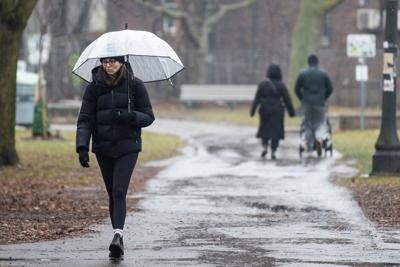If you thought last month felt unseasonably warm in Toronto, you may be onto something — the city clocked a record-breaking December in 2023, and experts say it's a sign of climate change "shifting our goalposts" for the weather.
That said, meteorologists tell the Star it's now time to bundle up — storms are brewing in Ontario, and colder days may soon be upon us.
Toronto's warm December
For the first time in recorded history, Toronto temperatures stayed above -5 C all December, with the lowest temperature measured at just -4.4 C on Dec. 22, according to Environment Canada data taken from downtown Toronto.
Toronto also broke records for hottest day earlier in the month with a high of 13.2 C on Dec. 15 — the warmest measured in December since records began in 1840.
Overall, December 2023 was the second warmest on record, with an average temperature of 3.6 C. The warmest happened eight years ago in 2015, at 5.1 C.
"The fact that 2023 had a warm temperature, and the record is held by 2015, does suggest that there has been a gradual increase in temperatures" over the years, Environment Canada meteorologist Peter Kimbell told the Star, adding that temperatures appeared "well above average" so far this winter.
You might be interested in
Why was this winter so warm in Toronto?
While climate change certainly played a factor in 2023's warm winter, it was also the result of El Nino, Toronto's increasing urbanization and an unfortunately overcast December, Weather Network meteorologist Doug Gillham told the Star.
"The warmest December on record in Toronto was 2015 — which was the last strong El Nino event," he noted. The Weather Network previously forecast a warm beginning to winter due to the returning El Nino weather pattern, although the rest of winter is looking more normal, Gillham said.
Toronto's growing urbanization has also made the city warmer over the decades, as a result of the urban heat island effect, he continued — city buildings, roads and infrastructure absorb and re-emit heat better than natural environments, leading cities to typically become warmer than rural towns. It's partly why Toronto's temperatures have risen on average since 1840, as the city grew by leaps and bounds.
Another major factor was the constant cloudy skies the city experienced all month, which served as a "blanket that keeps the heat trapped near the surface (instead of) escaping into space," Gillham said.
"Climate change has moved the goalposts," he explained — our range of potential temperatures has shifted warmer, but cold Decembers will still exist.
"You can still have cold winters, but (climate change) makes the mild winters or a mild month more likely, and makes it slightly warmer than it might have been otherwise."
Winter storms headed for Toronto
While the next few months are still "changeable," Gillham forecasts it will "be more like a normal winter."
January has already started off more wintry than December, with parts of central and eastern Ontario currently under winter storm watch, expected to bring heavy snowfall and potential freezing rain.
"Next week it's going to be cold," Gillham continued, adding that Toronto could see a "messy storm" on Tuesday with snow turning into rain. There may also be a "significant storm" at the end of the week.
February is also looking like a more normal, wintry month, he said.
"It's normal to have thaws in Toronto, the reality is the ground is usually only covered in snow half the time," Gilham said. "What was unusual with December is the ground was bare most of the time, and we never dropped below minus five. Whereas January and especially February will be more of a typical winter."
"Winter has not been cancelled," he said, "although it kind of felt that way in December."













Anyone can read Conversations, but to contribute, you should be a registered Torstar account holder. If you do not yet have a Torstar account, you can create one now (it is free).
To join the conversation set a first and last name in your user profile.
Sign in or register for free to join the Conversation